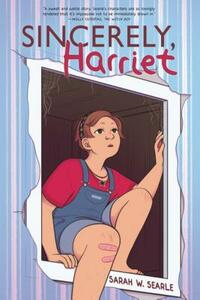Take a photo of a barcode or cover
Harriet and her family get a handle on her illness and their new location/life. Books and a wise neighbor help.
The book had a great premise but fell flat because of the execution. I wasn't able to care about the main character, whom I found annoying and whiny, especially since we don't find out about her illness until very late in the book. I got quickly bored reading about her letters to friends who don't write back, which is more of an obsession really, since she didn't really know them as well. I wish the book focused more on Harriet's personality disorders (she is constantly lying, making up stories about the people around her) or at least the chronic illness aspect.
The one thing I enjoyed was the character Pearl, an elderly woman who lives downstairs, who is trying to connect to Harriet and keeps recommending books that might help her, even though she doesn't really even bother to read them.
The artwork was ok, but nothing particularly notable about it.
The one thing I enjoyed was the character Pearl, an elderly woman who lives downstairs, who is trying to connect to Harriet and keeps recommending books that might help her, even though she doesn't really even bother to read them.
The artwork was ok, but nothing particularly notable about it.
emotional
hopeful
lighthearted
reflective
fast-paced
Plot or Character Driven:
Character
Strong character development:
Complicated
Loveable characters:
Yes
Diverse cast of characters:
Yes
Flaws of characters a main focus:
Complicated
TBH I wasn’t feeling reading today. We all have those days, but after some disappointing news yesterday reading was the last thing I wanted to do today. However my goal of reading a book a day in the summer would not be ignored. Enter Sincerely, Harriet.
✏️
Harriet is bored and stuck at home in her apartment in Chicago, missing her friends at camp during the ‘90’s. Harriet also is dealing with multiple sclerosis She befriends the older landlady who tells Harriet what it was like for her son who had polio in the 1950s. She gets Harriet to write down her feelings. This helps her find an outlet for her loneliness & her active imagination.
✏️
This was a very quiet graphic novel and just what I needed today. Something a bit serious but not too sad. Learning about various chronic illnesses can put things into perspective and the artwork was very appropriate for MG audience.
✏️
Harriet is bored and stuck at home in her apartment in Chicago, missing her friends at camp during the ‘90’s. Harriet also is dealing with multiple sclerosis She befriends the older landlady who tells Harriet what it was like for her son who had polio in the 1950s. She gets Harriet to write down her feelings. This helps her find an outlet for her loneliness & her active imagination.
✏️
This was a very quiet graphic novel and just what I needed today. Something a bit serious but not too sad. Learning about various chronic illnesses can put things into perspective and the artwork was very appropriate for MG audience.
this graphic novel had some lovely illustrations and an interesting story that anyone who moves to a new (bigger) city can relate to. Harriet struggles with loneliness, restlessness, and a lot of curiosity. She also has something else going on in her life that you find out later on that helps connects some dots.
A sweet book about a lonely girl trying to find comfort in herself and in her surroundings. As a disabled woman I'm so happy to see all of the work geared towards younger audiences centering on living with a disability or recognizing yourself as disabled. I'm familiar with Searle's comic work from anthologies I've picked up, but this is the first full-length story I've read by her. The colors within the panels are muted and calming, which contrasts strongly with the summer heat Searle described, as well as the turmoil that Harriet is going through: it makes for an interesting layer to an already great story. I'm looking forward to more young adult stories by Searle.
Moving is already tough... without piling on a bunch of other things.
It's hard to talk about this book without spoiling aspects of the story.
Searle reveals the circumstances around this kid and their life bit by bit.
But the things revealed are largely what make the book unique.
This book is a good demonstration of the compounding effects of different kinds of marginalization. Harriet is Latinx, and disabled, and even though both of her parents have jobs (Papa's a nurse, Mom's a mechanic :)), it's tough to keep up with the various bills that come from living with chronic illness.
Like so many fictionalized autobio pieces (I get the drift that this is marginally along those lines), this is a piece about the human need to connect. And be seen. And to find your place in the world.
Give it to the Telgemeier fans who are aging up a bit.
It's hard to talk about this book without spoiling aspects of the story.
Searle reveals the circumstances around this kid and their life bit by bit.
But the things revealed are largely what make the book unique.
Spoiler
This is a story about invisible disability. And chronic illness. Not so much the medical details of chronic illness - more about how having chronic illness affects everything else in life. In Harriet's case, her chronic illness has led to her family having to relocate to a bigger city where she can get treatment. She has left her friends. Her parents had to leave jobs they loved to get worse jobs that pay less in the bigger city.This book is a good demonstration of the compounding effects of different kinds of marginalization. Harriet is Latinx, and disabled, and even though both of her parents have jobs (Papa's a nurse, Mom's a mechanic :)), it's tough to keep up with the various bills that come from living with chronic illness.
Like so many fictionalized autobio pieces (I get the drift that this is marginally along those lines), this is a piece about the human need to connect. And be seen. And to find your place in the world.
Give it to the Telgemeier fans who are aging up a bit.
I wasn’t the biggest fan of this graphic novel.
However, I did find it interesting that the main character has MS and is going through the struggles of that sickness.
I honestly was not really able to connect to the main character other than feeling sympathy for her being sick.
However, I did find it interesting that the main character has MS and is going through the struggles of that sickness.
I honestly was not really able to connect to the main character other than feeling sympathy for her being sick.
adventurous
emotional
hopeful
informative
lighthearted
reflective
fast-paced
Plot or Character Driven:
Character
Strong character development:
Yes
Loveable characters:
Yes
Diverse cast of characters:
Yes
Flaws of characters a main focus:
No





